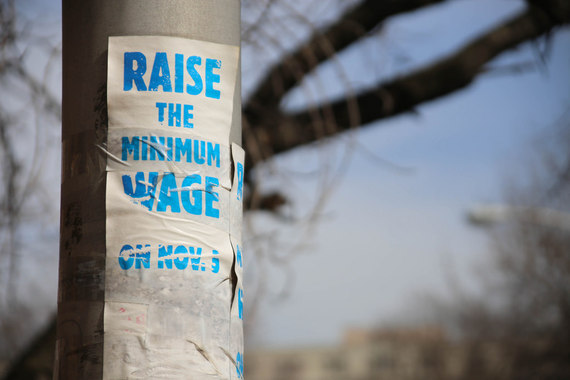Amid a barrage of depressingly frequent state-level attacks on abortion access, California Governor Jerry Brown and state labor unions struck a historic deal in April of 2016 that should be celebrated as a win for reproductive justice activists everywhere. Brown agreed to raise the minimum wage to $15 by 2022 and ensure that after 2024, the state minimum wage will be indexed to the cost of living. While the deal has been widely celebrated as a win for the grassroots Fight for $15 movement, many have failed to recognize how important increasing the minimum wage is for the reproductive justice movement.
This is unabashedly good news for the more than 5 million minimum wage workers across the state who will receive an average annual earnings increase of $3700. Increasing the economic security of minimum wage workers, important for all women, is welcome news for anyone who is invested in balancing the scale of power in favor of marginalized communities. For those of us who have witnessed the swift degradation of abortion rights over the last five years, however, the $15 minimum wage victory is particularly important.
Expanding workers' rights is a necessary tenet of the reproductive justice movement, as economic security is critical for all women - especially in light of the wage and other systemic disparities that women of color experience. Removing all barriers that stand in the way of a person's ability to access reproductive health care has always been and continues to be central to the reproductive justice movement . Since the Supreme Court's decision in Roe v. Wade, which recognized the constitutional right to terminate a pregnancy, reproductive justice activists have worked to make that right a reality. Reproductive justice activists recognize that ensuring everyone, regardless of income, has meaningful access to health care is integral to guaranteeing that right.
Increasing the minimum wage puts more money into workers' pockets, which is an important part of expanding economic security for workers and their families. While California does not require people to endure mandatory waiting periods or travel across state to access reproductive health care services, an abortion can cost upwards of $1000. Particularly for under-insured and uninsured low-wage workers, this cost can be prohibitive. Working folks should not be forced to choose between accessing the reproductive health care services they need and fulfilling other basic needs.
Putting more money in workers' pockets will affect more than just someone's ability to pay for an abortion. Increasing the minimum wage has also been shown to reduce child poverty among female-headed households. Thirty-one percent of minimum wage workers in California are women who have children, so Jerry Brown's decision will substantially affect their ability to achieve economic security and provide the kind of life they want for their families.
Raising a person's purchasing power means that they have more control over the direction and quality of their lives and their children's lives. While raising the minimum wage is not a catchall solution to barriers Californians face when trying to exercise their right to choose, it's certainly a step in the right direction. The reproductive justice movement should celebrate and rally behind any law that not only expands meaningful access to abortion services, but places economic control back into the hands of all people.
Written by Carley Towne
Carley Towne is an undergraduate student at UCSD who also works as a Student Journalist for Unite for Reproductive and Gender Equality (URGE).
Image by Paul Sableman via Flickr

